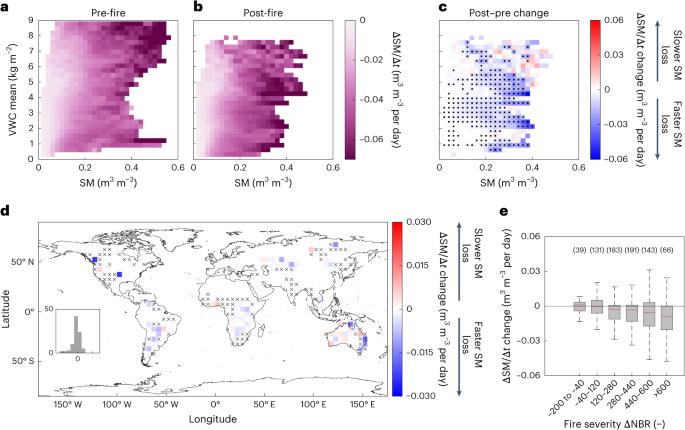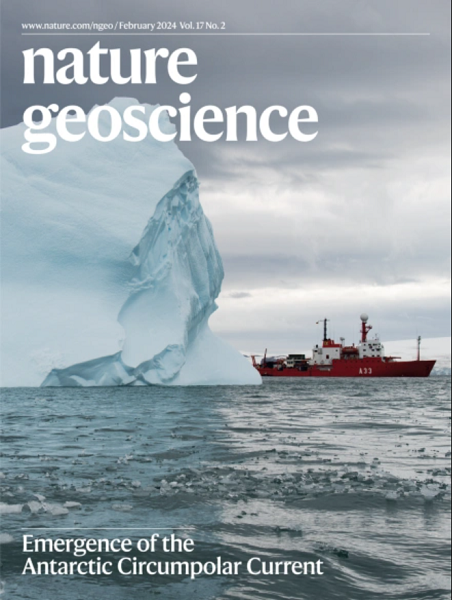Widespread and systematic effects of fire on plant–soil water relations
IF 15.7
1区 地球科学
Q1 GEOSCIENCES, MULTIDISCIPLINARY
引用次数: 0
Abstract
Wildfire activity and the hydrological cycle are strongly interlinked. While it is well known that wildfire occurrence and intensity are controlled by water availability, less is known about the effects of wildfire on plant and soil water cycling, especially at large scales. Here we investigate this by analysing fire impacts on the coupling between plant and soil water content, at the global scale, using remote sensing of soil moisture, vegetation water content and burned area. We find a strong effect of fire on plant–soil water relations, accelerating soil moisture loss by 17% and leading to faster gains in vegetation water content by 62%, both of which are positively related to fire severity and largest in forests. This effect is spatially extensive, with accelerated soil moisture loss found in 67%, and increased vegetation water content gain found in 67% of all analysed burned areas. After fire, plants also tended to have less control on their water content (that is, were more anisohydric). In summary, fire changes ecosystem functioning by increasing ecosystem water losses and shifting the relationship between soil and vegetation water budgets. With climate change, wildfire is likely to play an increasingly important role in ecosystem water cycling and subsequent ecosystem recovery. Fire affects the hydrological interactions between soil and vegetation, leading to faster soil moisture loss and accelerated vegetation water uptake, according to a global analysis of satellite observations on soil moisture, vegetation water content and burned area.

火灾对植物-土壤水分关系的广泛和系统影响
野火活动与水文循环密切相关。众所周知,野火的发生和强度受水分供应的控制,但人们对野火对植物和土壤水循环的影响却知之甚少,尤其是在大尺度范围内。在此,我们利用土壤湿度、植被含水量和烧毁面积遥感技术,分析了火灾对全球范围内植物和土壤含水量之间耦合的影响,从而研究了这一问题。我们发现,火灾对植物与土壤水分关系的影响很大,使土壤水分流失加快 17%,植被含水量增加加快 62%,这两者都与火灾严重程度呈正相关,而且在森林中的影响最大。这种影响的空间范围很广,在所有分析过的烧毁区域中,67%的区域发现土壤水分流失加快,67%的区域发现植被含水量增加。火灾后,植物对其含水量的控制能力也趋于减弱(即更加无水)。总之,火灾会增加生态系统的水分损失,改变土壤和植被水分预算之间的关系,从而改变生态系统的功能。随着气候变化,野火可能会在生态系统水循环和随后的生态系统恢复中扮演越来越重要的角色。根据对卫星观测到的土壤湿度、植被含水量和烧毁面积进行的全球分析,火灾会影响土壤和植被之间的水文相互作用,导致土壤水分流失加快,植被吸水加速。
本文章由计算机程序翻译,如有差异,请以英文原文为准。
求助全文
约1分钟内获得全文
求助全文
来源期刊

Nature Geoscience
地学-地球科学综合
CiteScore
26.70
自引率
1.60%
发文量
187
审稿时长
3.3 months
期刊介绍:
Nature Geoscience is a monthly interdisciplinary journal that gathers top-tier research spanning Earth Sciences and related fields.
The journal covers all geoscience disciplines, including fieldwork, modeling, and theoretical studies.
Topics include atmospheric science, biogeochemistry, climate science, geobiology, geochemistry, geoinformatics, remote sensing, geology, geomagnetism, paleomagnetism, geomorphology, geophysics, glaciology, hydrology, limnology, mineralogy, oceanography, paleontology, paleoclimatology, paleoceanography, petrology, planetary science, seismology, space physics, tectonics, and volcanology.
Nature Geoscience upholds its commitment to publishing significant, high-quality Earth Sciences research through fair, rapid, and rigorous peer review, overseen by a team of full-time professional editors.
 求助内容:
求助内容: 应助结果提醒方式:
应助结果提醒方式:


